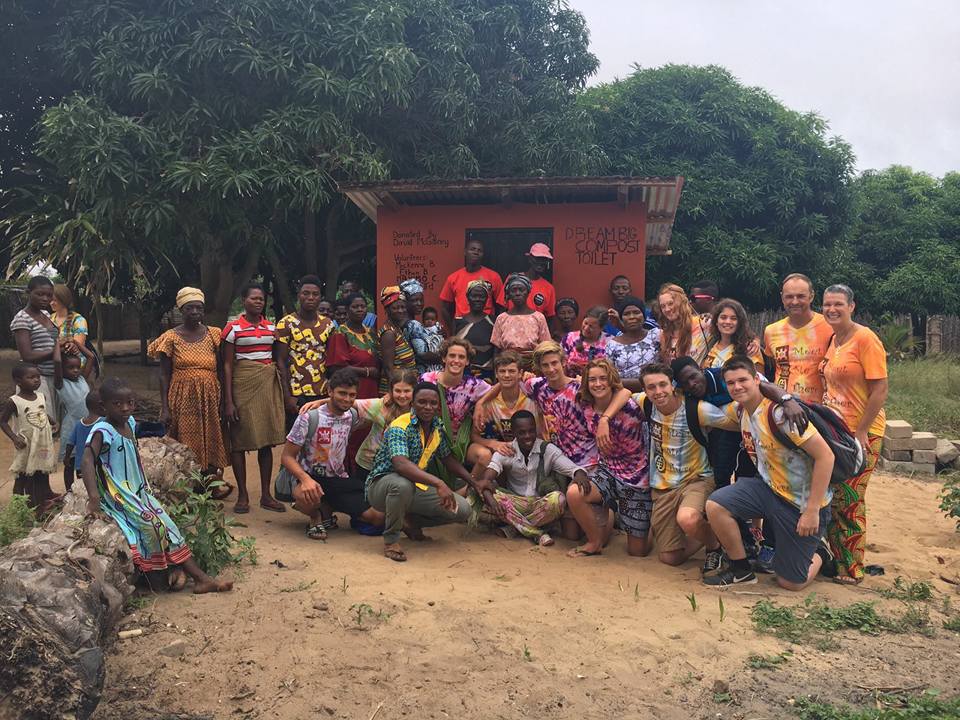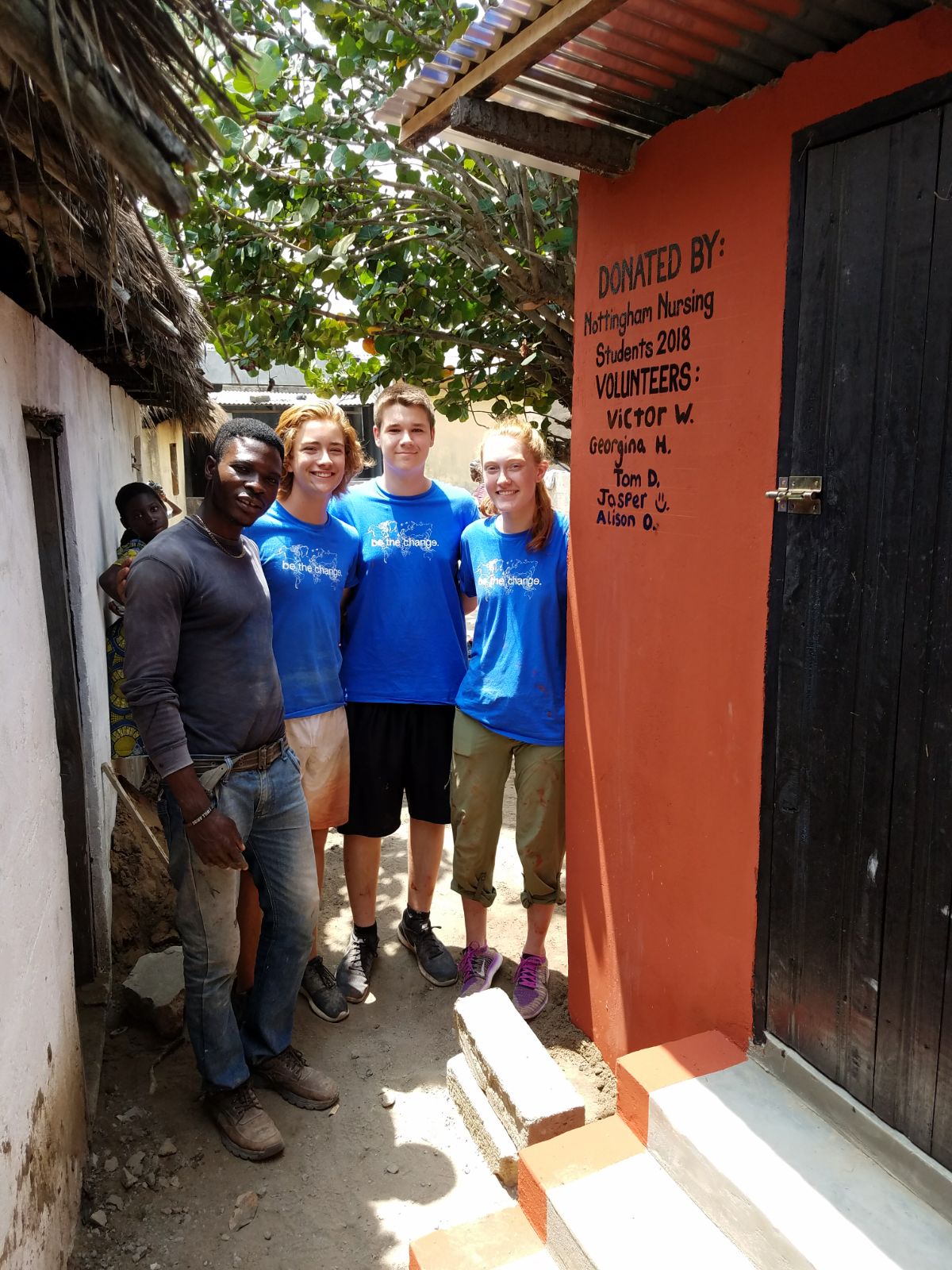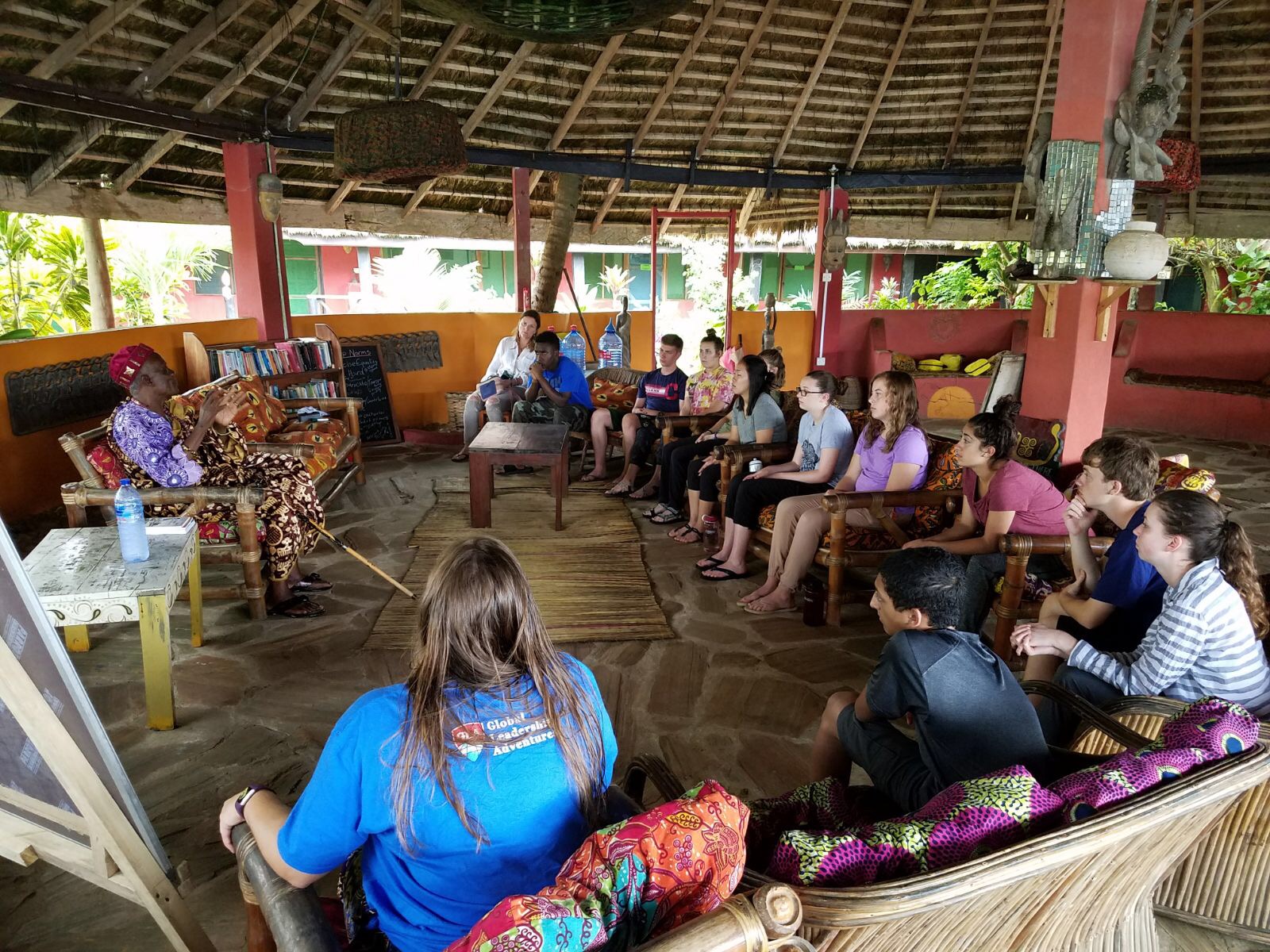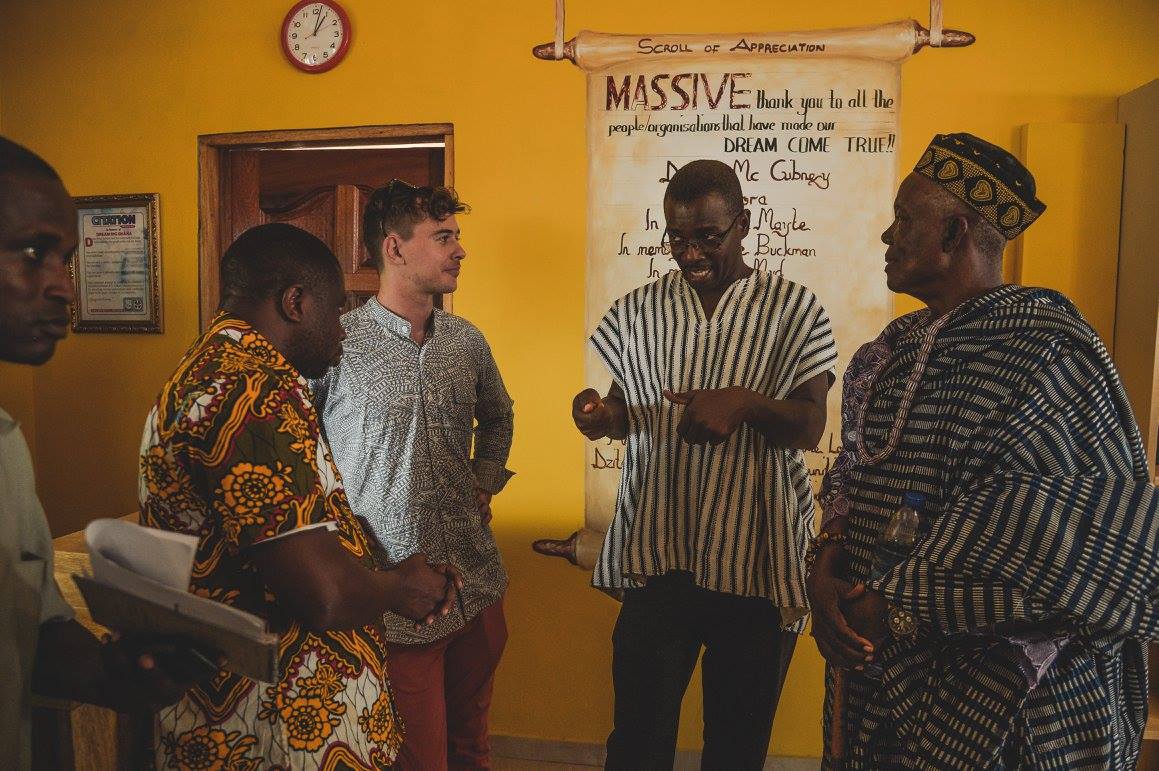When you’re building a toilet in rural Ghana, you realize that talking about toilets isn’t gross—it’s essential.
When nearly 2.5 billion people around the world don’t have access to satisfactory sanitation, a simple facility can be a gamechanger. Questions about this toilet-building project on GLA's program Ghana: Building Healthy Villages nearly always start out with a cheeky grin, or a wrinkled nose: "What do you mean they use the compost from the facility as fertilizer?" "Does it smell?" (It doesn't.)
The questions start out as jokes, but after understanding the immediate benefit of building an eco-compost toilet—providing residents with a safe place for relief, and compost that can be used to grow food sustainably—or meeting the people who will finally have regular access to a sanitary facility for the first time in their lives, there’s only one question left: "Why aren’t more people helping to build these?"

GLA students return home with this realization year after year, and apply their hands-on experience to spreading awareness of international development and global health issues.
Here are some of their life-changing stories that all began with building toilets in Ghana.
1.“Jasper is one of the local masons responsible for building the toilets here for Dream Big Ghana, the NGO we are working with. Jasper also happened to be the mason at my particular site. Jasper is very strong. When you ask him how he is feeling, he always responds with, “Strong like bull.” This statement is by no means an exaggeration—he lifts 50 kg cement bags with ease and carries large bricks on his shoulder. The man doesn’t talk much, often responds to questions with single words or short, deep grunts. However, Jasper truly is a great and funny guy. He works incredibly hard and almost never takes a break. When he does, he likes to showcase his dance moves before getting right back to building.
In Ewe [ay-way], the local language, a white person is referred to as a Yevu and a black person is referred to as Amayibo. These words are not at all considered disrespectful, and are used here in excess. Jasper, too, likes to use these words in humorous fashion, often referring to himself as Amayibo in the third person, creating phrases such as “Amayibo never tired,” and “Amayibo strong.” Similarily, Jasper calls me Yevu and likes to joke using this word. When taking a break, Jasper will ask me “Is Yevu tired?” Or when I am carrying a headpan full of sand and he passes by, he says, “Yevu very strong.”
These words imply that there is a difference between Jasper and I, which I guess there is—Jasper is more capable at what we are doing here in every single way. However, our difference is no point of contention. Working here in Dzita with Jasper by my side has been one of the greatest things about my trip thus far."
–Victor, student, Ghana: Building Healthy Villages

Students with Jasper, local legend, at their finished eco-compost toilet
2. “On Sunday, we got back to work plastering the outside of our eco-compost toilets. We returned from service that day exhausted and covered in mortar, but were rejuvenated by Justine’s [Home Base staff] Ghanaian style pizza. The Kilele drumming group then led us in a great drum and dance workshop, and by the end of the session we could perform a traditional dance and play the accompanying drum part.
After the session, a few of us talked with several members of the drumming group. They shared their knowledge on a large variety of topics, including but not limited to: American rap, reggae, Bob Marley’s legendary status, Jamaican slang, American culture’s strong ties to Ghana, their impending tour in the U.S., love and marriage, the difference between Ghana and America. Then we had dinner and began the celebration of birthdays for today. As per the Home Base’s tradition, the birthday boy and girl were to be covered in water, covered in flour, then thrown into the lagoon. Amber was hesitant, but accepted her fate. Ballo took more convincing—we cornered him in the kitchen and tackled him. Ballo (and everyone holding him) was soaked with dishwater. We picked him up and carried him to the deck. He splashed into the water and then quickly swam to shore.
We ended the night with a song and a special birthday ceremony. We passed around a cup of sugar and water, each saying a blessing to Amber and Ballo and taking a sip. We cut a cake and told fable-style stories until we all went to bed.
Akpe from Ghana and talk to you soon.”
–Ethan, student, Ghana: Building Healthy Villages
3. “Ghana and the United States—specifically the parts that I’m familiar with—make for an interesting comparison. An example of a difference between the two is how people react to death. From my experience, Americans typically have tearful, serious funerals with family and friends. Ghanaians, however, throw happy, loud funerals with drums and dancing. In Ghana, death results in a celebration of life. The difference between how two cultures deal with the same event fascinates me.
Ghana and the United States also have similarities, arguably more than differences. We all share values of caring for family and working hard. We also both take pride in our environments and value nature around us. Finally, both place great emphasis on community and socializing. My trip to Dzita, Ghana, from Seattle, USA, has taught me that even countries that appear to be polar opposites have similarities that overpower their differences.”
–Joy, student, Ghana: Building Healthy Villages
4. “Jasper is a beast. Never have I met someone who can do hard work at the rate he does. Known as Amega—boss man—Jasper leads Danesh, Rain and me to glory each day as we come closer to finishing the compost toilet for the community. After hours of working, with beads of sweat rolling down Jasper’s face, I begged him to take a break. But he refused, and continued to lead a one-man show. His determination and commitment to finishing the project is inspiring. He motivates us all through his intense and fiery spirit, his forgiving and accepting attitude, and his occasional goofy dancing, to be leaders and better people. Jasper never gives up, never gives in, and never breaks down. His generosity of spirit and laughter has drawn everyone from the work site to him, and continues to amaze me day after day. Jasper truly is a beast.”
–Jed, student, Ghana: Building Healthy Villages
5.“Though lacking monetary wealth, the people of Ghana are wealthy in ways first-world citizens do not often experience. My first experience with Ghanaians was on the plane ride to Accra. The plane was filled with people who carried US passports with covers bearing the proud name of Ghana. It was the most pleasant flight I have ever taken. The passengers were kind in helping me, a young solo flyer, and enthusiastic when we landed in the beautiful country—their home country.
Since landing, I have met all kinds of people, each unique in many ways but similar in their joyful, kind-hearted demeanor. Walking down the street, children sing to us, “Yavv Yavv Gaibo,” and adults give greetings of “Mia Werzo!” You’d expect that with a language barrier, people might be quick to give up on communication; however, I have yet to meet a Ghanaian who did not at least give me an enthusiastic wave.
The people of Ghana are what I will miss the most about this beautiful country."
–Anonymous student, Ghana: Building Healthy Villages

Students learn about the colorful culture of Ghana
6.“In the first few days of our adventure to Ghana we have all grown in multiple ways. Today we visited Keta slave fort, a somber experience. We learned about the horrors that slaves endured at the hands of first the Dutch, then the British. Our experience gave us a different perspective to see slavery from. We were able to compare what we saw to what we’ve heard about it, and the history we were taught about the slave trade in the United States. Visiting the slave fort helped deepen our understanding of Ghana. I am sure that this will not be the last of our growths.”
–Noah, student, Ghana: Building Healthy Villages
7.“After a ten-hour flight, I entered Ghana exhausted. Nevertheless, I was awoken by the country’s liveliness. The ride from the airport in Accra to Home Base in Dzita was around three hours. As the wheels began to turn, I felt myself beginning to wake up. My eyes became fixated on the street vendors, their products ranging from detailed, colorful clothing to varieties of ground nuts. The women, men and children carried baskets on their heads filled with goods, fruits and other necessities. I saw school kids, their faces lighting up with warm smiles as our van drove by. “Yahoo, yahoo!!” they would yell. We returned the smiles and waves.
When we pulled into Home Base, I was immediately embraced and greeted by warm smiles that made me feel safe and welcomed home. I was told by our group mentor that here in Ghana, you say hello and wave to everyone you pass, even from a van. Here, taking that extra step to greet someone is not only expected and polite, but normal. I felt a smile spread across my face. I was safe, welcomed home. I was finally fully awake.”
–Anonymous student, Ghana: Building Healthy Villages
8.“One of the most memorable evening activities I experienced while in Ghana was the introduction to Ghana's health care system, given by a local nurse named Rose. We learned the structure of the healthcare system, beginning with the local hospital director, then the district director, the regional director and the head of the system, the director general. The director general supervises all the medications coming into Ghana.
Learning how the health system works made me want to know about my own country’s. I also think that learning about all the levels of organization in the health system, and the similar free vaccinations Ghana offers its citizens at birth (they actually offer more than the United States), made me realize that regardless of what you think you may know about a country and its economic status, you might be wrong.”
–Rain, student, Ghana: Building Healthy Villages
9. “This was my daughter’s first solo trip—and such a big one. First, I have to share a funny coincidence with you. As I was saying goodbye to Béa at the airport, I caught a glimpse of someone whom my father had known. This man is a drummer and played music at my father’s memorial service five years ago. I only met him once, but he and my dad were friends through their love of music. I learned that this man was on both of Béa’s flights—all the way through to Accra! She was too shy to introduce herself, but it gave me so much peace just knowing that my father’s friend was there on her first trip to Africa. It makes my heart full.”
–Amanda, mom of Béa, Ghana: Building Healthy Villages
Ghana: Building Healthy Villages is one of GLA’s longest-running programs. We’ve partnered with the NGO Dream Big Ghana for several years, allowing students to explore West African culture and themes of global health—including the importance of clean water, sanitation and hygiene—while building an eco-compost toilet from start to finish for a local Ghanaian community. It is one of our most directly impactful programs, with students having the privilege to officially present the finished project to the community (complete with a local celebration!).
Learn more about the program, or get in touch with an Enrollment Advisor now to reserve a spot on a session in 2018.
 Dream Big Ghana's founder and GLA International Director, Dougal Croudace, meets with local leaders in Dzita, Ghana.
Dream Big Ghana's founder and GLA International Director, Dougal Croudace, meets with local leaders in Dzita, Ghana.

